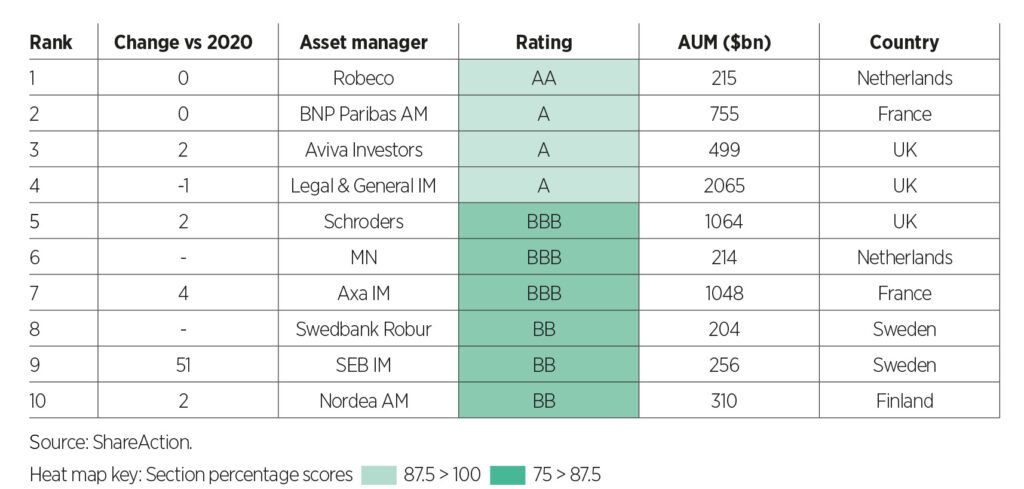Robeco, BNP Paribas Asset Management, Aviva Investors and Legal & General Investment Management (LGIM) have topped ShareAction’s ranking of asset managers on responsible investment credentials – but no group received the top AAA grade indicating improvements still need to be made.
ShareAction’s annual assessment of fund groups’ performance on ESG, Point of No Returns 2023, found wide variations across the sector with only a small number of the asset managers – 77 of the world’s largest asset managers were analysed – performing well consistently across the themes; governance, stewardship, climate, biodiversity and social.
Robeco gained an AA rating and held on to the top spot in the group tables for at least the third year in a row, scoring high in governance, stewardship and social but less so on climate and biodiversity.
Retaining the second space, BNP Paribas AM gained an A rating performing well for stewardship, biodiversity and social, but less well in governance and climate.
“Most managers had some better and worse performing areas, highlighting where much progress needs to be made,” the report said.
The world’s largest asset managers across responsible investment themes

Since 2020, ShareAction said there has been a slight drop in the number of asset managers achieving AAA-A or BBB-B grades and more than two-thirds of the groups assessed received a CCC rating or less.
Two-thirds of the managers surveyed – handling $60trn in assets – scored a CCC rating or worse, indicating “serious gaps in their responsible investment policies and practices for at least one theme”, said ShareAction.
However, the number of groups graded D or E has fallen from 51% in 2020 to 35% in 2023.
The non-profit also flagged five asset managers showed dramatic improvement jumping more than 30 spaces each; these are JP Morgan Asset Management (JPMAM), Santander Asset Management, T.Rowe Price, Deka Investment and SEB Investment Management – JPMAM climbed almost 60 spaces.
“Their improvements have come from the adoption of effective policies across one or more of the themes we investigate, more robust stewardship practice (including, for example, formalised engagement guidelines), and the adoption of a framework for positive climate-related investment,” the report said.
“Different asset managers made specific improvements in different areas: SEB IM was stronger on climate- and biodiversity-related issues, while T. Rowe Price performed better in stewardship and on social issues. However, these five asset managers did not represent best practice across the survey in general, despite their improvements.”
Declines in rankings
At the other end of the scale, ShareAction said a number of asset managers “lost significant ground” and saw their positions drop. Allianz Global Investors, NN Investment Partners, Pimco, State Street Global Advisers and PGGM saw their ranking decline, with Allianz GI seeing a drop of 37 positions.
NN IP and PGGM, as well as weaker performers such as State Street GA. Biodiversity was a particularly weak area for all five of the asset managers whose ranking declined the most. PIMCO was also held back by its stewardship performance, and Allianz and State Street by their governance. Rather than evidence of their performance deteriorating, it is likely that the five have simply not kept up as standards have improved across the sector since 2020.”
Some asset managers also showed “consistently poor approaches” to responsible investment and these manage a disproportionately large colume of assets.
Four of the world’s five largest asset managers – BlackRock, Vanguard, Fidelity and State Street – were ranked D or E. JPMAM, the fifth out of the biggest groups, was ranked B.
“Positively, the improvement shown by JPMAM and top 10 rankings achieved by AXA IM, Legal & General IM and Schroders –- who each manage assets of over $1trn – show that size is not a barrier to progress on responsible investment issues.”
Claudia Gray, head of financial sector research at ShareAction, said: “A majority of the world’s largest asset managers are failing to meet even basic criteria, let alone take the steps needed to help protect people and planet for generations to come.
“The impact of the decisions these asset managers make cannot be understated. As managers of tens of trillions of dollars, and investors in the biggest companies from many industries, their decisions have a vast impact all over the world. They should be considering their effects on our climate, the ecosystems providing our life-support systems, and human wellbeing worldwide. These problems create real risks for the big companies and their investors, but as our research has uncovered, there remains a lack of ambition to drive real-world improvements.”
